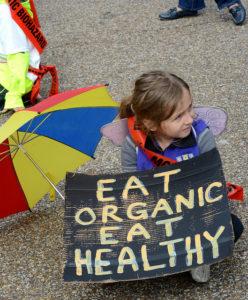 If the thought of having your food created and modified by the world’s largest pesticide manufacturer creeps you out, you’re not alone. The report from a recent analysis performed by the National Academy of Sciences – a private nonprofit that provides advice from experts – isn’t likely to make you feel much better.
If the thought of having your food created and modified by the world’s largest pesticide manufacturer creeps you out, you’re not alone. The report from a recent analysis performed by the National Academy of Sciences – a private nonprofit that provides advice from experts – isn’t likely to make you feel much better.
Par for the course, they tell us that from a health and environmental perspective, there’s probably nothing to worry about. Over biotech’s 20-year span, the authors insist, there’s been no evidence of harm.
But put that safety record into context. The applied practice of agriculture dates back 23,000 years, according to US and Israeli researchers. Twenty years is a drop in the proverbial bucket.
The implication that 20 years implies safety eerily strikes the same chord as the ADA talking points on dental mercury (“It’s been used for more than 150 years…”).
Perhaps that’s why the 388-page report does little to ease the tension created by a virtual tug-of-war between citizens questioning GE crops on one end and university scientists and ag “experts” on the other. Former Secretary of Agriculture Dan Glickman has hinted at the weight of our discord:
With all that technology has to offer, it is nothing if it’s not accepted.
Even the chair of the NAS report, Fred Gould, appears to understand this lack of acceptance:
This boils down to a matter of trust. Trust in the science behind the process, but particularly trust in the regulatory process that ensures through review – including complete and open public involvement.
It’s not like biotech hasn’t employed strategies designed to coerce our trust, such as playing on our Western sympathies to “feed the world” and a promising to create better foods than nature itself could. These patented, miracle-working seeds, they swore, were going to reduce pest and plant disease issues, give farmers better crop yields.
But even the NAS report itself conceded that some of those promises don’t hold water.
For one, GE crops fall short on the yield promise. Pests and plant diseases have responded to glyphosate with increased resistance. Glyphosate has been linked to cancer. Agrarian-based countries in Africa , as well as other nations such as Haiti have refused donated GE seed, even in times of dire need. Nineteen EU countries have banned GE seed.
Not exactly the stuff of trust-building.
Neither is patenting the divine given source of life, suing small farmers for patent infringement caused by pollen drift, or statistically eliminating the traditional practice of seed cleaning. Neither is the 75% loss of genetic diversity in crops over the last 20 years.
If transparency and balanced, independent research were made available, trust might be possible. But rather than risk rejection, biotech’s new plan to win us over appears to lie in designing crops with health claims.
Instead of addressing the relationship between glyphosate and cancer, biotech has “created a pink pineapple that includes lycopene, an antioxidant that gives tomatoes their bright red color, and could play a role in fighting cancer.” They’re piercing at the nucleus of a real tomato to insert high levels of anthocyanins from blueberries, with the promise that the “improved” purple tomato can lower the risk of cancer and heart disease.
If you’re a bit of a cynic, you might find it strange that the industry that makes and sells a broad-spectrum systematic herbicide and crop desiccant linked to cancer is also going to provide foods grown with it that will lower the risk of cancer.
It sounds crazy, but hey, people might just buy it. Especially if we don’t realize it’s genetically engineered.
Image by Stephen Melkisethian, via Flickr